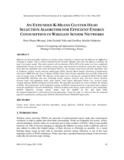An extended k-means cluster head selection algorithm for efficient energy consumption in wireless sensor networks

View/
Date
2023-05Author
Mwangi, Peter M.
Ndia, John G.
Muketha, Geoffrey M.
Metadata
Show full item recordAbstract
Effective use of sensor nodes’ batteries in wireless sensor networks is critical since the batteries are difficult to recharge or replace. This is closely connected to the networks’ lifespan since once the battery is used up, the node is no longer useful. The entire network will not function if 60 to 80% of the nodes in it have completely depleted their energy. In order to minimize energy usage and sustain the network for a long time, many cluster head selection algorithms have been developed. However, the existing cluster head selection algorithms such as K-Means, particle swarm selection optimization (PSO), Density-Based Spatial Clustering of Applications with Noise (DBSCAN) and Fuzzy C-Means (FCM) cluster head election algorithm have not fully reduced the issue of energy usage in WSN. The objective of this paper was to develop an extended K Mean Cluster Head selection(CHS) algorithm that uses remaining energy, distance between node and base station, distance between nodes and neighbour nodes, node density, node degree Maximum Cluster size, received signal strength indicator (RSSI) and Signal to Noise Ratio. The algorithm developed was used to enhance the lifespan of WSNs. The performance of the simulated variants of LEACH routing protocols is measured and evaluated using the quantitative research methodology. Utilizing residual node energy, packet delivery ratio, throughput, network longevity, average energy usage, and the number of live and dead node, the suggested approach is contrasted to previous approaches. From the study we observed that the proposed approach outperforms existing actual LEACH, Mod-LEACH and TSILEACH approaches.
Collections
- Journal Articles (CI) [118]
